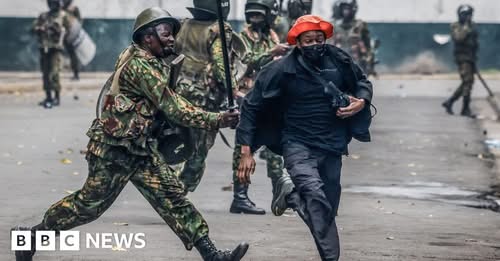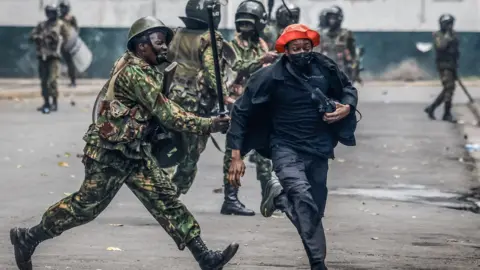
Are East African governments uniting to silence dissent? » Capital News

Kenya has been hit by a recent wave of repression, tarnishing its reputation as a beacon of democracy in East Africa.
Critics fear that it is sliding down the path of her neighbours – Uganda and Tanzania, both of which are notorious for cracking down on dissent.
Kenya’s laws are widely regarded as being more progressive – particularly in protecting fundamental freedoms like the right to protest.
But Kenya has witnessed an increasing crackdown on protests – the latest example being the killing of at least 10 people in nationwide demonstrations against President William Ruto’s government while it attempted to ban live TV and radio coverage of the protests.
“Rogue Regime” – declared the headline of Kenya’s respected Standard newspaper as it pointed out that young people had flooded the streets in defiant remembrance of those gunned down a year ago in mass anti-tax demonstrations but “Instead of a listening ear they were met with razor wire, armoured trucks and the cold grip of repression”.
But as far as Interior Minister Kipchumba Murkomen is concerned, the police showed “remarkable restraint” as they foiled an “attempted coup”.
“We condemn the criminal anarchists who in the name of peaceful demonstrations unleashed a wave of violence, looting, sexual assault and destruction upon our people,” he said, accusing the protesters of attacking police stations and injuring 300 officers.
However, the Law Society of Kenya (LSK) condemned the police for their handling of the protest.
“The unnecessary aggression and brute force that culminated in the senseless loss of life and senseless destruction of property have no place in a free democratic society,” it said.
The crackdown came just weeks after a 31-year-old blogger and teacher, Albert Ojwang, died in police custody. He was arrested after being accused of defaming a senior police officer – and died in detention of assault wounds, an autopsy found.
His death triggered a small protest in the capital, Nairobi, which police clamped down on and a street vendor, who was caught in the crossfire – shot at close-range, is fighting for his life in hospital.
The LSK denounced his shooting as unbefitting for “any sane democracy”.
Its comment brought into sharp focus the fact that Kenya risks losing its status as a democracy that many Tanzanians and Ugandans envied – and drew inspiration from.
Tanzanian political analyst Nicodemus Minde said there had long been an “appreciation” among Tanzanians of the ability of Kenyans to “speak truth to power”.
It was a view shared by Tanzania’s main opposition leader Tundu Lissu who told the BBC last year that “We have not pressed hard enough for democratic reform”.
“What Kenya did to build its democratic space is something we need to do,” he said.
Having miraculously survived an assassination attempt after being shot 16 times in 2017, Lissu has become a symbol of state repression in Tanzania.
He is currently in detention, charged with treason for rallying his supporters under the slogan “No reform; no elections”.
The government saw this as an attempt by Lissu to launch a rebellion – and he risks being sentenced to death if convicted.
The 57-year-old opposition leader sees his detention as an attempt by the Chama Cha Mapinduzi (CCM) party – which has been in power since independence in 1961– to clear its path to victory in presidential and parliamentary elections scheduled for October.
This perception has been strengthened by the fact that his Chadema party has been barred from contesting the poll after it refused to sign an electoral code of conduct that it believed would undermine its right to campaign freely.
The opposition in Uganda sees itself in a similar situation, pointing out that President Yoweri Museveni has been in power for almost 40 years, and – along with his son, Muhoozi Kainerugaba, who heads the army – is cracking down on political rivals in the build-up to elections in early 2026.
Ugandan opposition politician Kizza Besigye has been in detention since November, with the government wanting to try him for treason in a military court after accusing him of plotting to overthrow the government – a charge he denies.